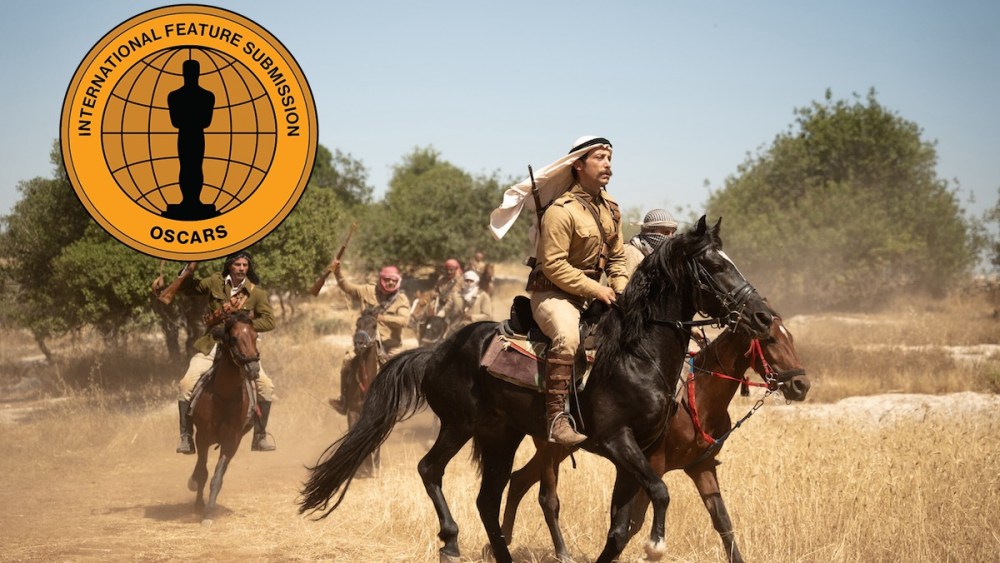The Country’s Epic Oscar Submission
“Prescient” is perhaps the most appropriate word to describe “Palestine 36.” As the whole world focuses on Gaza, a film about the history of the conflict in the Middle East could not be more timely. However, Annemarie Jacir’s epic film has many other strengths. It’s grand in scale, ambitious in storytelling and balanced in the way it pays equal attention to historical scope and detailed characterization. The film, which is Palestine’s entry to the Oscars, has a lot of story to tell, but still manages to singularly draw its many characters and to give specificity to its different locations. It demands the audience’s undivided attention and earns it by the end of its running time.
As the title implies, the film covers a little more than a year in Palestine, when it was a British colony. There’s a nominal lead in Yousef (Karim Daoud Anaya), a young man who toggles between Al Basma, the small farming village where he was born and still lives, and the big city of Jerusalem, where he works as a driver for Amir (Dhafer L’Abidine), a prominent Palestinian journalist who also moonlights as a political operative. In the village, the farmers see their land dwindle as settlers escaping antisemitism in Europe seize some of it. In the city, British officers, Palestinian freedom fighters and journalists start to set their agenda for the inevitable conflict about the future of Palestine.
The story starts with almost unrelated fragments, capturing the lives and struggles of a few characters who rarely cross paths. Before long, however, its many threads cohere into a complete narrative of a nation on the brink of seismic change. While a work of fiction, “Palestine 36” evokes a sense of historical profundity through its rich characters and complex situations, as if drawn from a thick bibliography of real experiences.
In the village, we meet Yousef and his family. There’s also his neighbor Rabab (Yafa Bakri), a widow with whom he’s smitten. Rabab’s family, who also work the land, include her parents (Hiam Abbas and Kamal El Basha) and her young daughter, Afra ( Wardi Eilabouni). Afra has a friend in Kareem (Ward Helou), the young son of the Christian priest in the village, Father Bolous (Jalal Altawil). Through these characters, Jacir builds a tapestry of interrelationships to show how life is changing among different generations.
In the city, we meet Amir’s wife, Khuloud (Yasmine Al Massri), a journalist who writes under a male pseudonym because women weren’t respected enough to be listened to. There’s also the British governor (Jeremy Irons) and his secretary (Billy Howle), who’s sympathetic to the Palestinian cause. Two themes emerge as central to the narrative: the quiet yet ruthless economic war over land, with bureaucratic processes turning ownership into a tool of dispossession, and the way citizens come to realize that their country is being stolen and start to organize a resistance. Jacir’s screenplay sharply depicts the class divide among Palestinians, contrasting the farmers in rural areas and the educated elite in the metropolis, with Yousef as the conduit between the two.
The film has a few scenes that could stand alone as short, singular narratives. One set on a train stopped by Palestinian freedom fighters shows how people came together to support the rebellion against the British mandate. As their leader Khaled (Saleh Bakri in a performance full of gravitas) asks for handouts, the camera captures the camaraderie developing between people who minutes earlier were just strangers passing each other. As each passenger reaches into their pockets for money — or to their necks and hands for jewelry — the camera captures, in their looks, the commonality of purpose they now all share.
Another is of a group of British officers and their families having a picnic by the village where most of the action takes place. We see Palestinian children running around, treated as exotic beings, while the Brits bring chairs and tables to large umbrellas to protect from the Mediterranean sun. Jacir uses all these visuals as evidence of how colonialism works: The British are there to spend some leisure time, and they seemingly don’t care about how they leave the place and what their presence might change.
The storytelling in “Palestine 36” is marked by constant physicality. Violence is bodily — faces are struck, bodies are constrained or tied down, as eyes cry and noses bleed — but so too is the affection: a hug between comrades, a fleeting touch between potential lovers, an embrace of a caring grandmother. When the village comes together, picking up and throwing stones at the British military hiding behind their armored cars, the contrast becomes even clearer. Therein lies the story of how these people persevered and resisted despite the violence constantly coming at them.
The performances are uniformly excellent and in tandem with each other — true ensemble work where each actor complements his screen partners. The one missed note is Robert Aramayo as the villainous British military captain, who’s missing only a twirling mustache in how caricatured the character is written and performed. Visually, “Palestine 36” looks sumptuous, with detailed period-specific costumes and photography that captures the sweeping nature of the storytelling (a few odd flourishes among the crowd scenes notwithstanding).
“Palestine 36” resonates because it binds the personal to the political, showing how resistance emerges in both quiet and explosive forms. Jacir’s film reminds that history is not abstract, but lived through families and small moments of solidarity and conflict. By uniting epic scope with intimate detail, it delivers a portrait of a people fractured yet unbroken. When it hits its final note, a catharsis is felt by the audience as history and today’s reality intertwine.

